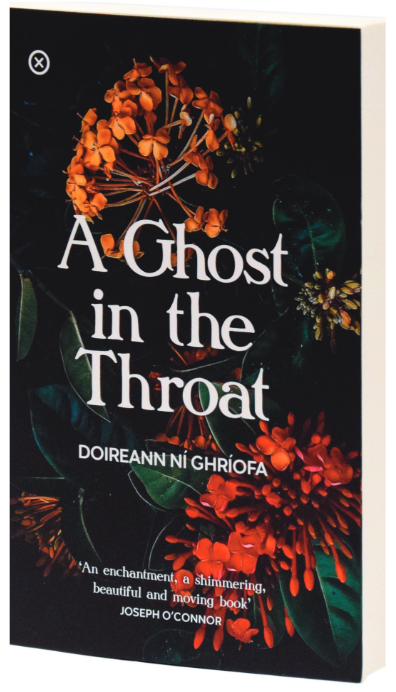
Geneva Pattison
Winner of the 2020 An Post Book Awards’ Irish Book of the Year category, A Ghost in the Throat is a truly unique and delicately woven piece of prose. Doireann Ní Ghríofa’s book invites the reader to discover the realities, worries and innermost thoughts of her own life, her experience with motherhood and her journey to discover the lost history of Eibhlín Dubh Ní Chonaill’s existence.
The book begins with a powerful statement.“This is a female text”, an exclamation, a eulogy, an elegy and a reminder that the everyday lives of women matter. The beginning of the book sees Ní Ghríofa map out her day to day life, the chores and childcare rituals that keep her world ticking over. We are introduced to Eibhlín Dubh’s Caoineadh, a lament that seems to melt away the author’s current surroundings and welcomes us back to her childhood, the very first time she and Eibhlín met. Of course, she jokes that Eibhlín “… had been dead for centuries.”. The author paints a picture of herself as a young girl, pulled from her daydreaming, into the harsh and emotional world of a poem from the 1700’s.
Upon her second encounter with Eibhlín’s poem, the writer is a teenager and finds herself engrossed in the romance of the text. The sheer force of Eibhlín’s words calls to her from across time. One voice calling to another, to share in the love and the loss. So engrossed with this poem was the young Ní Ghríofa, that she found herself filling in the blanks with tender caresses and dramatic thundering hooves, from her own imagination. This is only the second iteration of the writer’s life intertwining with the Caoineadh. As the book develops, we see how the poem has acted as both a guiding light and a protective entity to Ní Ghríofa, often shaping her movements and charting her life’s path. All roads seemed to lead her to Eibhlín Dubh Ní Chonaill.
The author fills in some of the missing pieces surrounding the life of Ní Chonaill with care, despite there being very little written accounts of her in her childhood home at Derrynane or being married to Airt Ó Laoghaire. She was the aunt of political leader Daniel O’Connell and even in relation to that fact, there is little written mention of her. While delving into her research, Ní Ghríofa reflects on the fact that much of Eibhlín’s patchwork history has been moulded by the writings of men. The subject of Caoineadh Airt Uí Laoghaire, is her husband and his death, which often eclipses Eibhlín as the wordsmith and speaker. Like a woman written out of history, she has been “occluded by the shadows of men”. A Ghost in the Throat combats this notion, through Ní Ghríofa’s conscious choice to include accounts and lists of her daily cleaning, cooking and childcare responsibilities, a reflection that the everyday labours of women matter and should be celebrated. These tasks help shape her day, give it meaning, while she dedicates the space in between to studying the Caoineadh, her search for truth.
As Ní Ghríofa continues to research and reflect on the poem, we see her lay out her own version of a lament. She illuminates the complex revelations she had while dissecting bodies donated to science, in her past life studying dentistry. Not just on morality, the fleeting nature of life or the selflessness of giving your body to science, but the space that surrounds life and life after death. She recalls dreaming about the dissection room, well before ever seeing it in person. The room itself haunts her, in a neutral but transformative way. It acts as a liminal space, a portal between her visions of her past self and her future self.
The role of motherhood features heavily in the book, with Ní Ghríofa laying out her own trials with a complicated birth and witnessing mothers and babies struggle in the neonatal wards. She brings the reader’s attention to the emotional bond between mothers and babies and internal and external fights mothers battle to provide for their children. This is also reflected in her search for Eibhlín’s story, she wonders what motherhood looked like for her?
A Ghost in the Throat is an astounding piece of work. It marries the unusual with the mundane to create this beautifully empathetic award winning text. Ní Ghríofa’s personal reflections feel like a friend relating their story. More often than not, her words will summon you forth through the pages to stand next to her, to share in the joys and sorrows of life.
In creating this text she has in a way come full circle, for just as Eibhlín called out to her, Ní Ghríofa has called out to us and this time, we will
listen.



